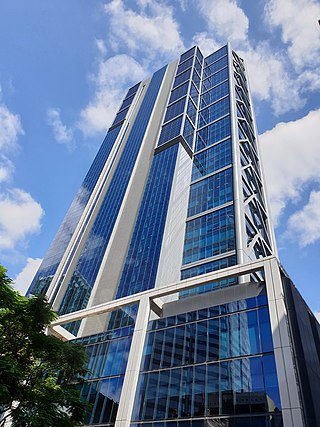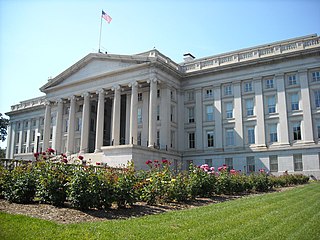A Singapore Sling is a tax avoidance scheme in which a large multinational company sells products to a subsidiary owned by them in a jurisdiction with lower tax rates, which acts as a 'marketing hub'. The subsidiary then sells the product to end users, marking up its value and attributing the mark-up to various marketing activities undertaken by the subsidiary. The parent company retains a higher profit margin due to the lower tax rate. Singapore is a popular location of such subsidiaries, given its low tax rates and its willingness to grant large multinationals 'sweetheart deals' – an extremely low tax rate in exchange for locating the multinational's marketing activities in Singapore. [1] [2]
Since at least 2015, it has been under investigation as an abusive practice in Australia. [3] [4]
Corporate haven, corporate tax haven, or multinational tax haven is used to describe a jurisdiction that multinational corporations find attractive for establishing subsidiaries or incorporation of regional or main company headquarters, mostly due to favourable tax regimes, and/or favourable secrecy laws, and/or favourable regulatory regimes.

BHP, officially named BHP Group Limited and formerly known as BHP Billiton, is an Australian multinational mining and metals public company headquartered in Melbourne, Australia.

Paul Hogan is an Australian actor and comedian. He was nominated for the Academy Award for Best Original Screenplay and won the Golden Globe Award for Best Actor – Motion Picture Musical or Comedy for his performance as outback adventurer Michael "Crocodile" Dundee in Crocodile Dundee (1986), the first in the Crocodile Dundee film series.
James Hardie Industries plc is a global building materials company and the largest global manufacturer of fibre cement products. Headquartered in Ireland, it is a dual-listed company, being listed on the Australian and New York Stock Exchanges. Its management team currently sits in Chicago, Illinois, United States. James Hardie was plagued by several asbestos-related scandals in the 20th century.

WMC Resources Limited was an Australian diversified mining company.
Jacques Albert Nasser is a Lebanese Australian American business executive and philanthropist. Known for a management career at Ford Motor Company spanning several decades and continents, from 1999 to 2001 he served as Ford's CEO and president. He subsequently was a partner at One Equity Partners (JPMorgan), as well as on the boards of British Sky Broadcasting and Brambles. Also previously on the international advisory council of Allianz and Chairman of the Australian mining company BHP Billiton from 2010 to 2017, Smart Company named Nasser No. 6 on a 2012 list of the "most powerful people in Australian boardrooms."
Harvey Norman is an Australian multinational retailer of furniture, bedding, computers, communications and consumer electrical products. It mainly operates as a franchise, with the main brand and all company-operated stores owned by ASX-listed Harvey Norman Holdings Limited. As of 2022, there are 304 company-owned and franchised stores in Australia, New Zealand, Europe and South-East Asia operating under the Harvey Norman, Domayne and Joyce Mayne brands in Australia, and under the Harvey Norman brand overseas.
Christopher James Lynch is an Australian businessman who is currently a director of Westpac. He is a former chief financial officer and board member of Anglo-Australian resources companies Rio Tinto and BHP Billiton, and a CEO of Transurban. Lynch was a member of the AFL Commission between 2008 and 2014. He played five matches for Geelong Football Club in the Victorian Football League.
Charles Waterhouse "Chip" Goodyear IV is an American businessman and the former CEO of BHP. He is a member of the Goodyear family that had extensive business interests in lumber and railways, as well as significant philanthropic endeavors.

The Ravensthorpe Nickel Mine is a nickel mine and hydrometallurgical processing plant located at Bandalup Hill, 35 km (22 mi) east of Ravensthorpe, Western Australia.
The Minerals Resource Rent Tax (MRRT) was a resource rent tax formerly imposed by the government of Australia on profits generated from the mining of non-renewable resources in Australia. It was a replacement for the proposed Resource Super Profit Tax (RSPT).

Nathan Tinkler is an Australian mining industry executive and was previously the principal shareholder of Aston Resources and Whitehaven Coal. He started out as a mining apprentice in the Hunter Valley, in New South Wales and set up his own business at age 26. Much of his wealth was acquired from investments in the mining industry.

The Double Irish arrangement was a base erosion and profit shifting (BEPS) corporate tax avoidance tool used mainly by United States multinationals since the late 1980s to avoid corporate taxation on non-U.S. profits. It was the largest tax avoidance tool in history. By 2010, it was shielding US$100 billion annually in US multinational foreign profits from taxation, and was the main tool by which US multinationals built up untaxed offshore reserves of US$1 trillion from 2004 to 2018. Traditionally, it was also used with the Dutch Sandwich BEPS tool; however, 2010 changes to tax laws in Ireland dispensed with this requirement.

The Olympic Dam mine is a large poly-metallic underground mine located in South Australia, 550 km (340 mi) NNW of Adelaide. It is the fourth largest copper deposit and the largest known single deposit of uranium in the world. Copper is the largest contributor to total revenue, accounting for approximately 70% of the mine's revenue, with the remaining 25% from uranium, and around 5% from silver and gold. BHP has owned and operated the mine since 2005. The mine was previously owned by Western Mining Corporation. Since the 1970s environmentalists, traditional owners and others have campaigned against the mine, largely on the basis of its contribution to the nuclear cycle and its use of underground water.

Base erosion and profit shifting (BEPS) refers to corporate tax planning strategies used by multinationals to "shift" profits from higher-tax jurisdictions to lower-tax jurisdictions or no-tax locations where there is little or no economic activity, thus "eroding" the "tax-base" of the higher-tax jurisdictions using deductible payments such as interest or royalties. For the government, the tax base is a company's income or profit. Tax is levied as a percentage on this income/profit. When that income / profit is transferred to a tax haven, the tax base is eroded and the company does not pay taxes to the country that is generating the income. As a result, tax revenues are reduced and the country is disadvantaged. The Organisation for Economic Co-operation and Development (OECD) define BEPS strategies as "exploiting gaps and mismatches in tax rules". While some of the tactics are illegal, the majority are not. Because businesses that operate across borders can utilize BEPS to obtain a competitive edge over domestic businesses, it affects the righteousness and integrity of tax systems. Furthermore, it lessens deliberate compliance, when taxpayers notice multinationals legally avoiding corporate income taxes. Because developing nations rely more heavily on corporate income tax, they are disproportionately affected by BEPS.

South32 is a mining and metals company headquartered in Perth, Western Australia. It was spun out of BHP Billiton on 18 May 2015. It is listed on the Australian Securities Exchange with secondary listings on the Johannesburg and London Stock Exchanges.

The Mariana dam disaster, also known as the Bento Rodrigues or Samarco dam disaster, occurred on 5 November 2015, when the Fundão tailings dam at the Germano iron ore mine of the Samarco Mariana Mining Complex near Mariana, Minas Gerais, Brazil, suffered a catastrophic failure, resulting in flooding that devastated the downstream villages of Bento Rodrigues and Paracatu de Baixo, killing 19 people. The extent of the damage caused by the tailings dam collapse is the largest ever recorded with pollutants spread along 668 kilometres (415 mi) of watercourses.

Dutch Sandwich is a base erosion and profit shifting (BEPS) corporate tax tool, used mostly by U.S. multinationals to avoid incurring European Union withholding taxes on untaxed profits as they were being moved to non-EU tax havens. These untaxed profits could have originated from within the EU, or from outside the EU, but in most cases were routed to major EU corporate-focused tax havens, such as Ireland and Luxembourg, by the use of other BEPS tools. The Dutch Sandwich was often used with Irish BEPS tools such as the Double Irish, the Single Malt and the Capital Allowances for Intangible Assets ("CAIA") tools. In 2010, Ireland changed its tax-code to enable Irish BEPS tools to avoid such withholding taxes without needing a Dutch Sandwich.

Bermuda black hole refers to base erosion and profit shifting (BEPS) tax avoidance schemes in which untaxed global profits end up in Bermuda, which is considered a tax haven. The term was most associated with US technology multinationals such as Apple and Google who used Bermuda as the "terminus" for their Double Irish arrangement tax structure.
Repatriation tax avoidance is the legal use of a tax regime within a country in order to repatriate income earned by foreign subsidiaries to a parent corporation while avoiding taxes ordinarily owed to the parent's country on the repatriation of foreign income. Prior to the passage of the Tax Cuts and Jobs Act of 2017, multinational firms based in the United States owed the U.S. government taxes on worldwide income. Companies avoided taxes on the repatriation of income earned abroad through a variety of strategies involving the use of mergers and acquisitions. Three main types of strategies emerged and were given names—the "Killer B", "Deadly D", and "Outbound F"—each of which took advantage of a different area of the Internal Revenue Code to conduct tax-exempt corporate reorganizations.